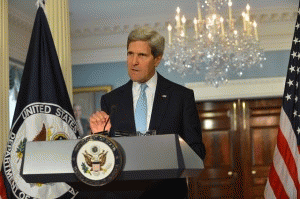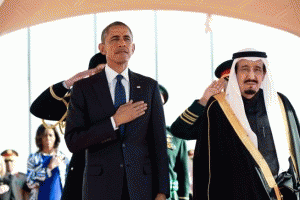Reprinted from Consortium News

U.S. Secretary of State John Kerry on Aug. 30, 2013, claims to have proof that the Syrian government was responsible for a chemical weapons attack on Aug. 21, but that evidence failed to materialize or was later discredited.
(Image by [State Department photo]) Details DMCA
The memorandum by 51 State Department officials calling for U.S. military intervention in Syria has been treated in news media coverage as a case of "dissent" from existing Syria policy by individual officials involved in Syria policy.
But the memo has all the earmarks of an initiative that had the blessing of the most senior officials in the department -- including Secretary of State John Kerry himself -- rather than having been put together by individual officials entirely on their own. And it may mark the beginning of an effort to take advantage of the presidential candidacy of Hillary Clinton.
The memo called for a "more militarily assertive US role" in the Syrian conflict in the form of "a judicious use of stand-off and air weapons, which would undergird and drive a more focused and hard-nosed US-led diplomatic process." That is precisely the policy option that Secretary of State Kerry has been widely reported to have championed privately for years. As the story in the New York Times, which published the supposedly confidential memo, noted, "[H]igher-level State Department officials are known to share their concerns."
The submission of the memo through the State Department's "dissent channel" appears to have been a device to make it appear entirely independent of senior officials in the department. According to the State Department regulation on the "dissent channel," it is to be used only when dissenting views "cannot be communicated in a full and timely manner through regular operating channels or procedures" or "in a manner which protects the author from any penalty, reprisal, or recrimination."
But there is no reason to believe that the officials in question had any problem in expressing their views on Obama's Syria policy over the years. The names of the signatories were not included in the document published by the New York Times, but all 51 officials claimed to have been directly involved in the making or implementation of Syria policy, according to the report. That would certainly encompass the vast majority of those who have worked on Syria over the past five years. It is inconceivable that those officials have not participated in innumerable policy discussions on Syria in which their personal views were freely expressed.
The Kerry Line
The supposed dissenters knew very well, moreover, that Kerry has been advocating essentially the same policy they were articulating for years. Kerry began making the case for sending large-scale, heavy weapons to armed opposition groups and carrying out cruise missile strikes against the Assad regime's air force in 2013. He continued to advocate that military option in meetings with the President, only to be rebuffed, according to the account by The Atlantic's Jeffrey Goldberg published in April.

ntion during the U.S. national anthem as the First Lady stands in the background with other officials on Jan. 27, 2015, at the start of Obama's State Visit to Saudi Arabia.
(Image by (Official White House Photo by Pete Souza)) Details DMCA
Obama became so irritated by Kerry's recommendations for cruise missile strikes in Syria that he decreed that only the Secretary of Defense would be permitted to recommend the use of force.
Since mid-2013, Kerry has been the leading figure in a political-bureaucratic coalition favoring a more aggressive military and covert action role in Syria. The coalition also includes the CIA's National Clandestine Services and civilian leaders in the Pentagon who are loath to see the United States cooperating with Russia and relying on its military power in Syria.
The arguments made by the purported dissenters are in line with some of Kerry's public talking points. Although he has not called for U.S. attacks on Assad's forces explicitly, Kerry has strongly hinted that there is little or no hope for progress in the political talks on Syria without some U.S. leverage on Assad. The memo sounds the same theme: "While the regime maintains the advantage," the authors aver, "an undeterred [Assad] will resist compromises sought by almost all opposition factions and regional actors."
Kerry frequently reiterates in public statements that the Islamic State (also known as ISIS or Daesh) cannot be defeated as long as long as Assad remains in power. The memo echoes his argument, asserting: "The prospects for rolling back Daesh's hold on territory are bleak without the Sunni Arabs, who the regime continues to bomb and starve."
The Nusra Question
The memo presents missile strikes as a way of responding to Assad's "egregious violations of the ceasefire." The idea that Assad is responsible for the breakdown of the ceasefire, which ignores the well-documented fact that many of the groups that Kerry calls the "legitimate opposition" openly sided with al-Nusra Front (Al Qaeda's Syrian affiliate) in deliberately and massively breaking the ceasefire, is also part of the Kerry State Department public posture.

(Note: You can view every article as one long page if you sign up as an Advocate Member, or higher).





